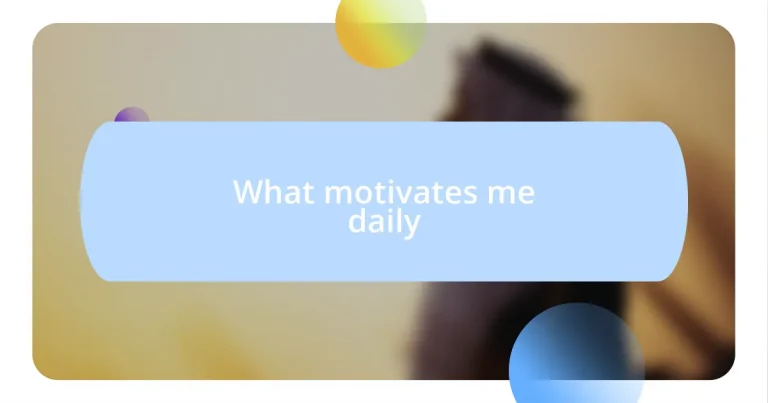Key takeaways:
- Daily motivation can stem from small victories and meaningful connections, fostering a sense of purpose.
- Effective goal setting involves being specific, measurable, realistic, and time-bound to enhance motivation and progress.
- Maintaining a growth mindset and practicing self-compassion can turn challenges into opportunities for learning and development.
- Tracking progress and celebrating small wins helps reinforce motivation and creates joyful moments of achievement.
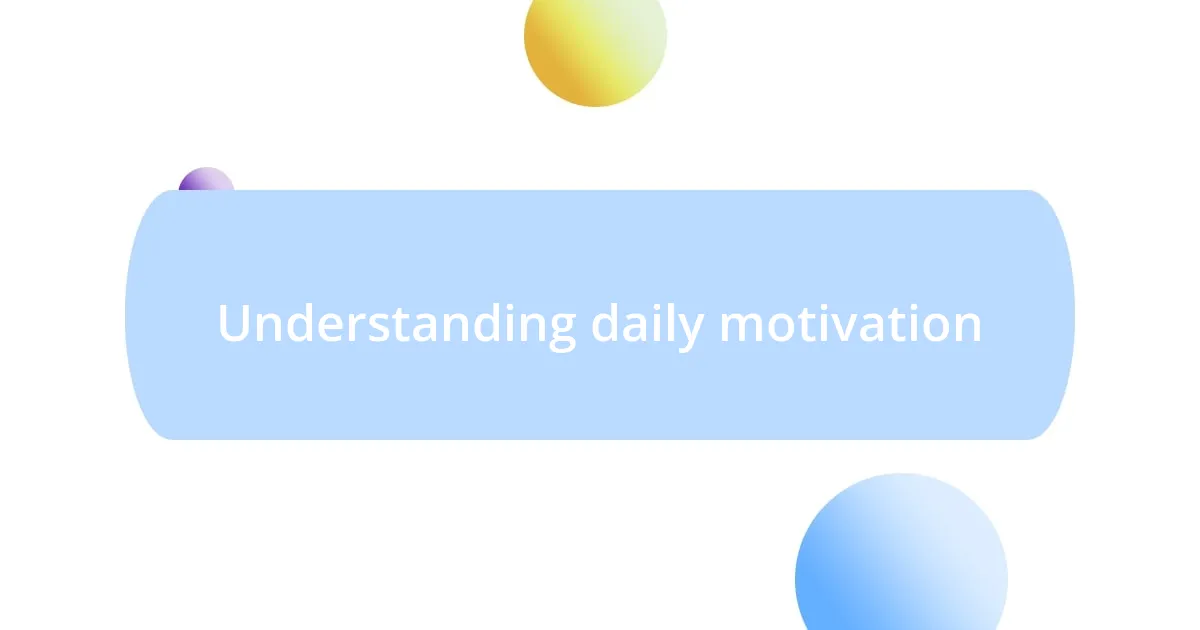
Understanding daily motivation
Understanding what drives me each day feels like peeling back layers of an onion, revealing both the obvious and the profound. For me, the morning sunlight that spills into my kitchen is a daily reminder of new possibilities. I often find myself asking, “What can I discover or achieve today?” This question sparks excitement and sets the tone for the hours ahead.
Reflecting on my own experiences, I’ve realized that motivation often stems from small victories. I remember the thrill I felt after completing a challenging project at work; it wasn’t just the end result that invigorated me, but the journey of overcoming obstacles along the way. Those personal accomplishments are what compel me to rise each morning, eager to tackle the next challenge.
Additionally, I sometimes wonder how my motivations align with my values. When I volunteer to support local communities, I feel a surge of purpose that can be hard to replicate elsewhere. This connection to my core values deepens my daily drive and reminds me that motivation can often blossom from service and a desire to contribute to something greater than myself.
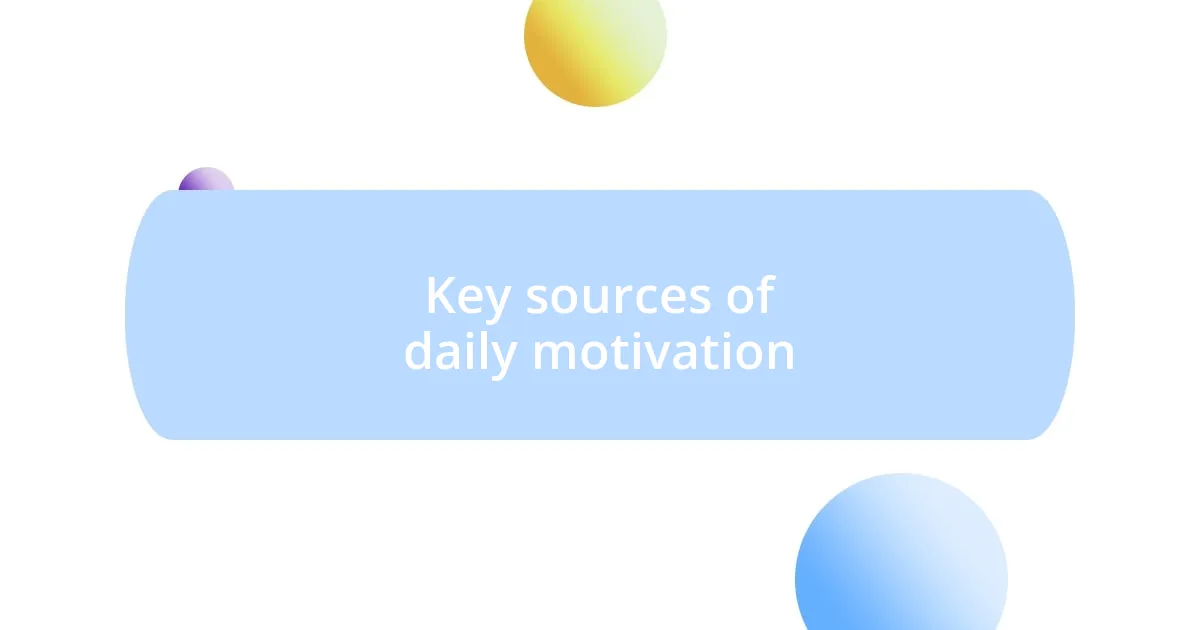
Key sources of daily motivation
When I think about the key sources of daily motivation, one stands out—relationships. The simple moments I share with family and friends can fill my days with purpose. For example, when my child excitedly shares their school achievements, it fuels my drive. Their joy makes me want to be my best self, in turn inspiring them.
Another important driver for me is goal setting. I remember when I first wrote down my personal and professional goals; it was like drawing a map for my journey. Each time I check off an item, I feel an immense sense of achievement that energizes me for the next task. This tangible progress keeps me focused and motivated, especially on days when I might otherwise feel overwhelmed.
Lastly, I often draw motivation from self-care routines. I realize that dedicating time to exercise and mindfulness helps reset my mental state. On mornings when I prioritize a workout, I feel invigorated and ready to take on the day. It’s amazing how physical health can influence mental clarity, reinforcing the idea that they are closely tied in fueling our daily ambitions.
| Key Source | Personal Insight |
|---|---|
| Relationships | Moments with loved ones inspire my daily drive. |
| Goal Setting | Writing down goals energizes my focus. |
| Self-Care Routines | Prioritizing exercise resets my mental state. |
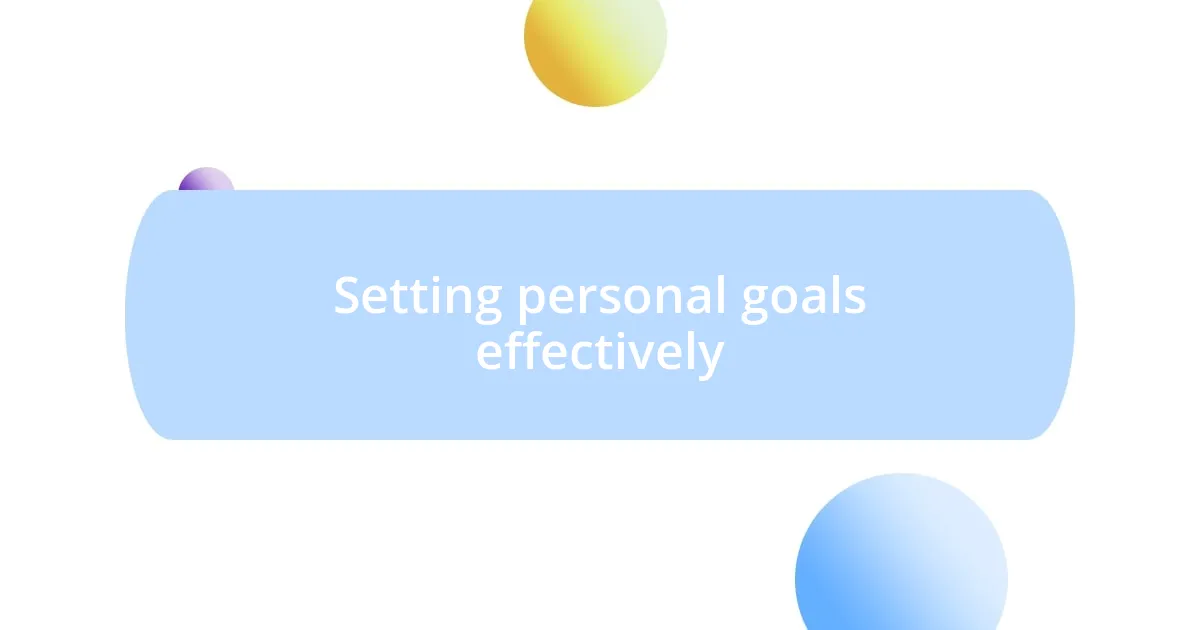
Setting personal goals effectively
Setting personal goals effectively requires a bit of self-reflection and strategy. I find that breaking down larger goals into smaller, manageable steps is incredibly helpful. For instance, when I decided to improve my fitness, I didn’t just jump into a rigorous schedule. I started with simple commitments, like taking a 15-minute walk each day. This not only made the goal feel achievable but also built my confidence with each small accomplishment.
Here are some key tips that work for me when setting personal goals:
-
Be Specific: Instead of vague ideas, I write down exactly what I want to achieve. For example, saying “I want to read more” transforms into “I’ll read one book a month.”
-
Make Them Measurable: I always try to quantify my goals. This way, I can track my progress easily, like my goal to save a certain amount of money by the end of the year.
-
Stay Realistic: It’s vital to set goals that are challenging yet attainable. I remember trying to learn a new language in three months and quickly realized that was too ambitious. I adjusted it to focus on conversational skills instead.
-
Set Timeframes: Giving myself deadlines creates urgency. For instance, I aim to complete a personal project by the end of the quarter, which helps keep my motivation alive.
Reflecting on my own journey, I can’t stress enough how important this process has been. I recall a time when I was trying to better my writing skills; I set a goal to write for 30 minutes daily. Not only did I notice improvement, but those 30 minutes also sparked creativity that spilled into other areas of my life. Each completed session made me feel accomplished, building a momentum I hadn’t anticipated. It’s these micro-moments of victory that truly motivate me to keep pushing forward.
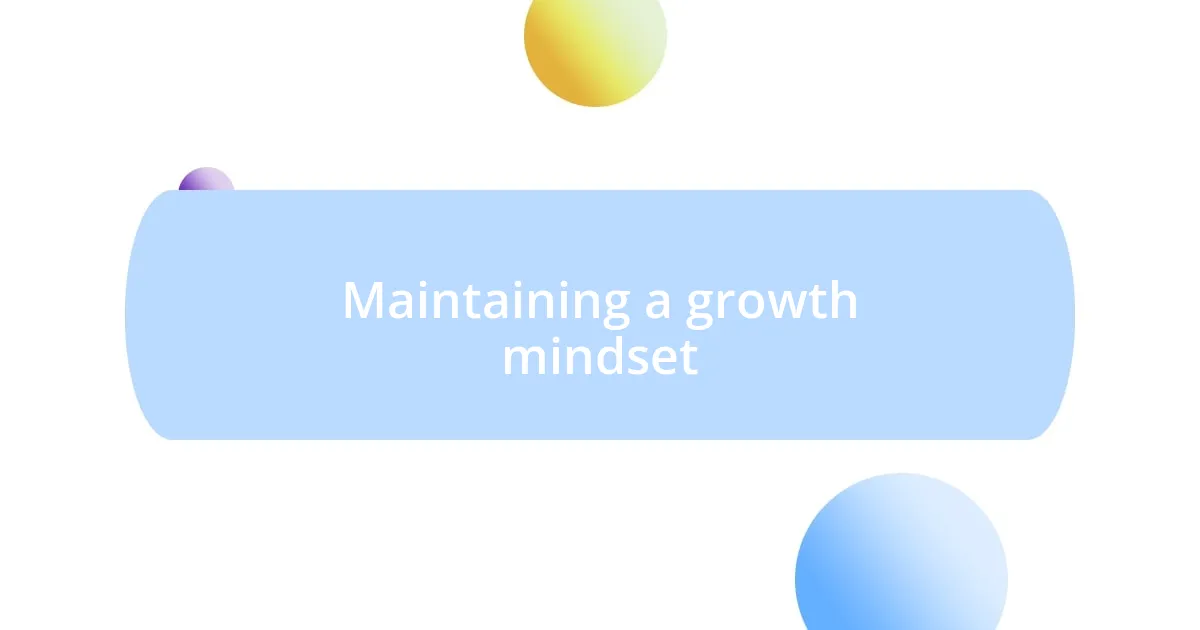
Maintaining a growth mindset
Maintaining a growth mindset is like nurturing a garden; it requires attention and care. I vividly remember when I faced a significant setback in my career. Instead of viewing it as failure, I took a step back and asked myself, “What can I learn from this?” That shift in perspective opened my eyes to valuable lessons. It taught me resilience, and I realized that challenges are opportunities for growth, not roadblocks.
I’ve discovered that surrounding myself with positive influences fosters my growth mindset. Attending workshops or connecting with mentors inspires me to see things differently. I recall a conference where a keynote speaker shared their journey of overcoming adversity. They emphasized the importance of embracing mistakes, which resonated deeply with me. I felt a sense of empowerment; it was like a light bulb went off in my mind. Changes in mindset can start from a single conversation or experience.
A growth mindset also means celebrating progress, however small. I often keep a journal to track my learning experiences and breakthroughs. Reflecting on my journey reminds me of how far I’ve come and keeps me motivated. Just last month, I wrote about a moment when I stepped outside my comfort zone to share an idea in a group meeting. The rush of confidence that followed was exhilarating. Don’t you think acknowledging our growth fosters a deeper appreciation for the journey? That’s what keeps my motivation alive every day.
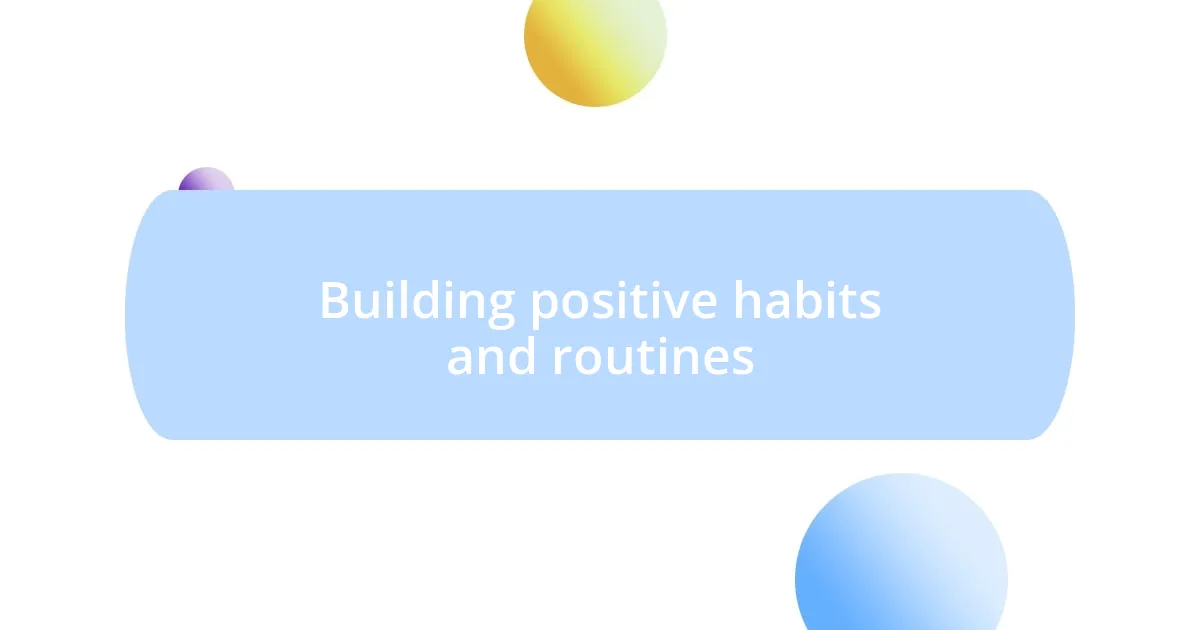
Building positive habits and routines
Building positive habits and routines can significantly shift our daily motivation. I remember when I decided to establish a morning routine. Initially, it felt daunting, but starting with just five minutes of mindfulness truly transformed my mornings. I often reflect, how different do I feel when I take that time vs. when I rush out the door? It’s a stark contrast that continues to remind me of the importance of those small moments.
One crucial aspect of building positive habits is consistency. I learned that it’s not just about the tasks themselves but about creating a reliable structure in my day. For instance, I chose to connect with nature daily by tending to my plants. I noticed that this little act not only grounded me but also became a cherished part of my routine. Isn’t it interesting how a simple habit can bring so much joy and motivation?
Establishing routines also involves being adaptable. There were weeks when my usual schedule got interrupted, and I struggled. However, I discovered that allowing flexibility in my routines could actually enhance my motivation. I once had to adjust my evening exercise to the morning due to a busy work week. To my surprise, that change revitalized my energy for the whole day! It’s a reminder that sometimes we need to embrace adjustments to keep our routines fresh and engaging.
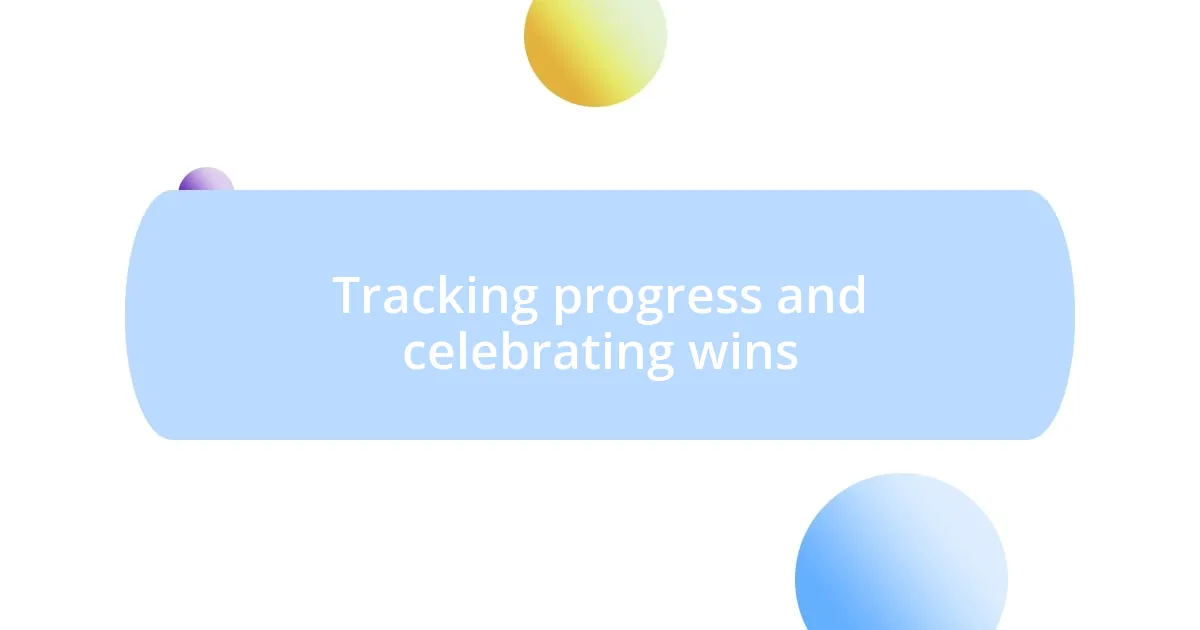
Tracking progress and celebrating wins
Tracking progress is something I’ve come to realize significantly enhances my overall motivation. For example, I started using a simple app to log my fitness achievements. Seeing those daily check-ins and the little milestones I’ve hit, like running an extra mile or lifting heavier weights, always brings a smile to my face. It’s almost magical to reflect on how those tiny victories build up over time and push me to keep going. Do you keep track of your progress in any area?
When it comes to celebrating wins, I’ve adopted the practice of treating myself after reaching certain goals. Whether it’s indulging in a favorite snack or taking a day off to relax, these small celebrations create joyful moments that reinforce my efforts. I recall a week when I completed a challenging project at work, and I went out for a nice dinner with friends to commemorate the achievement. Those moments of celebration fill me with a sense of accomplishment that keeps me excited for the next challenge ahead.
Acknowledging progress isn’t just about big milestones either; it’s the little victories that matter too. I make it a point to share my accomplishments with my close friends, and their enthusiasm becomes infectious. A while back, I proudly shared that I had read five books in a month, and my friends celebrated with a mini book club. Isn’t it amazing how sharing our wins can amplify their importance and inspire others?
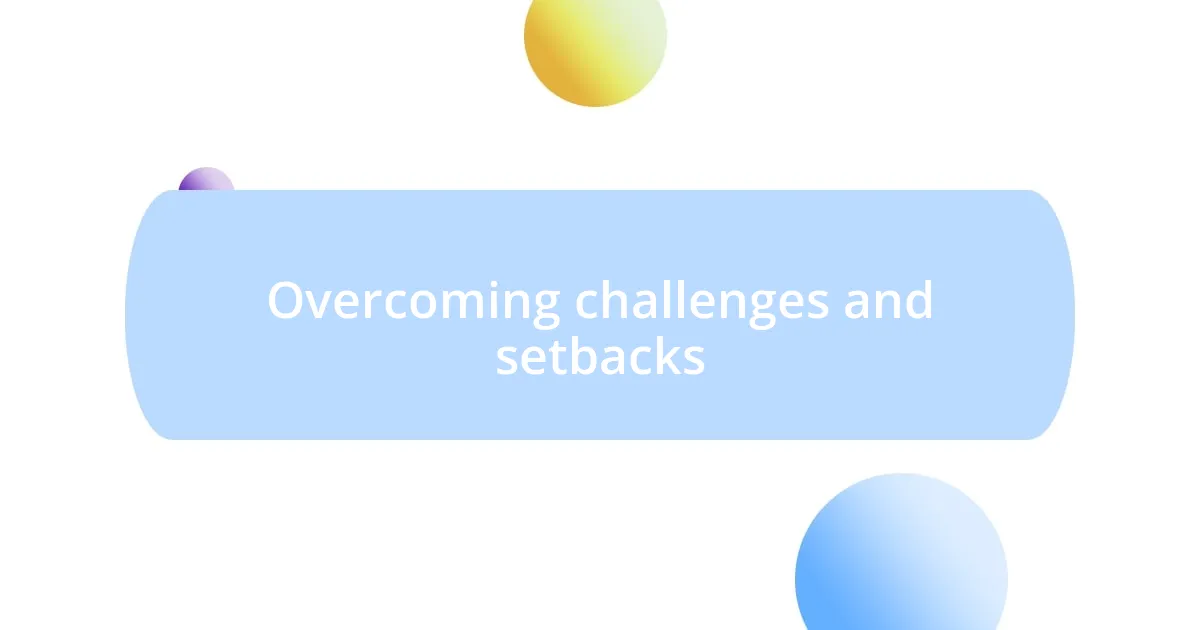
Overcoming challenges and setbacks
Overcoming challenges often feels like standing at the base of a steep mountain, but I’ve come to appreciate the lessons hidden in those tough climbs. I vividly remember when I faced a setback in my career that knocked the wind out of me. I had poured my heart into a project only to find out it didn’t resonate with my team. In that moment, I could have gotten discouraged, but instead, I asked myself, “What can I learn from this?” That shift in perspective helped me reassess my approach and ultimately led to a breakthrough on my next project.
Navigating setbacks requires resilience, but I’ve also realized it’s about self-compassion. Whenever I encounter a difficult period, I try to remind myself that it’s okay to feel frustrated or disheartened. For instance, during a particularly challenging month balancing work and personal life, I found my motivation dipping. I allowed myself to take a weekend to recharge, practicing self-care. That brief pause rejuvenated my spirit and refocused my energy—once I returned, I felt stronger and more prepared to tackle my goals.
Reflecting on challenges, I find that it’s these moments of struggle that often light the way forward. I think back to a time when I lost a significant client at work, which was disheartening. Instead of dwelling on the loss, I focused on what I could do differently moving forward. That experience guided me to refine my pitch and adapt my strategy. Looking back, I see how each challenge carved out a new pathway for growth—don’t you find it fascinating how setbacks can sometimes lead to unexpected opportunities?












